It’s natural for people to wonder whether an underlying health issue may be due to a tumor or another serious health issue, especially when you’ve got severe pain and discomfort. Tumors in the spine can cause back pain when the growth weakens the bone, which can ultimately result in spinal fractures, compression or impingement of the nerves, and spinal distress.
Table of Contents
Spinal Tumor Symptoms
Spinal tumor symptoms may ultimately be similar to those of other well-known health issues, including sciatica, especially if the spinal tumor irritates the sciatic nerve. The symptoms below may be commonly associated with a spinal tumor, including:
- Neck pain or back pain followed by neurological health issues, such as tingling sensations, weakness, and numbness in the upper and lower extremities as well as abnormal bladder and bowel habits.
- Painful symptoms, particularly in the morning
- Severe pain with manipulation of the affected region of the spine
- Painful symptoms which do not decrease with rest
- Back pain and other associated symptoms, such as loss of appetite, nausea, vomiting, weight loss, fever, or chills.
Other Symptoms of Spinal Tumors
Spinal tumors themselves may present a variety of other symptoms. Characteristics associated with spinal tumors include:
- Tumors which develop in the spine (primary tumors) are very rare
- Spinal tumors grow slowly and are benign, frequently occurring in younger adults
- Most spinal tumors have spread (metastasized) from another region of the human body
- For individuals who have cancer, an evaluation is required to determine if cancer has spread to the spine
Types of Spinal Tumors
Most back pain is caused by other health issues. However, when painful symptoms are caused by spinal tumors, it’s essential for a healthcare professional to perform an accurate diagnosis to follow-up with proper treatment. There are three types of tumors which can cause back pain; vertebral column tumors, intradural-extramedullary tumors, and intramedullary tumors.
Vertebral Column Tumors
Primary tumors: These type of tumors develop from the vertebrae or intervertebral discs in the spine. These commonly occur in younger adults. Osteogenic sarcoma, or osteosarcoma, is the most common type of malignant bone tumor. Many primary spinal tumors are generally considered to be rare and they will frequently grow slowly.
Metastatic tumors: These type of tumors frequently spread, or metastasize, from cancer in a different region of the human body. These spinal tumors will generally cause pain which doesn’t decrease with rest, can worsen at night and is commonly accompanied by other symptoms of spinal tumors, such as nausea or vomiting, weight loss, and fever or chills. In women, spinal tumors can spread from breast or lung cancer. In men, spinal tumors can spread from lung or prostate cancer.
Intradural-Extramedullary Tumors
Intradural-Extramedullary tumors develop inside the spinal canal below the membrane which protects the spinal cord but outside of the nerves. These spinal tumors grow slowly and are benign. However, they can cause pain and fatigue.
Meningiomas: These type of tumors commonly take place in the membranes surrounding the spinal cord and are often benign, however, they can be cancerous. These tumors are more frequent in middle-aged and elderly women.
Nerve sheath tumors (schwannomas and neurofibromas): These type of tumors originate in the nerve roots which exit from the spinal cord. This type of tumor grows slowly and is benign. It can take years before any health issues occur.
Intramedullary Tumors
Intramedullary tumors develop from within the spinal cord or within the nerves and frequently occur in the cells that promote physical support and insulating material for the nervous system or glial cells. These type of spinal tumors occur most commonly in the neck or cervical spine. Although these spinal tumors are considered to be benign, surgery to remove intramedullary tumors may be challenging. The two varieties of intramedullary tumors are ependymomas and astrocytomas.
Spinal tumor demonstrated in the lumbar spine of the patient.
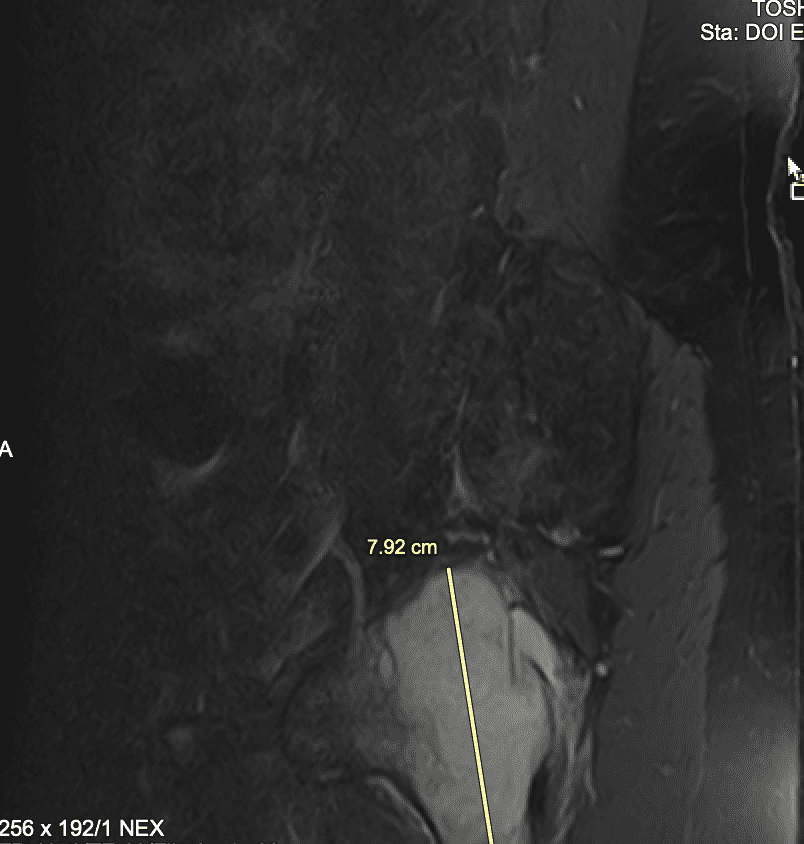
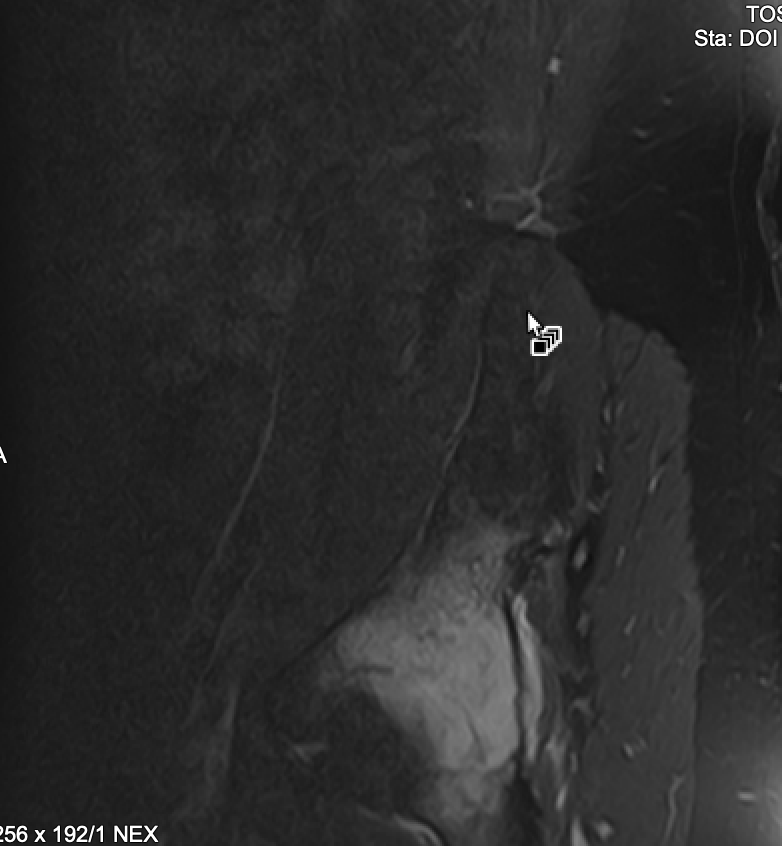
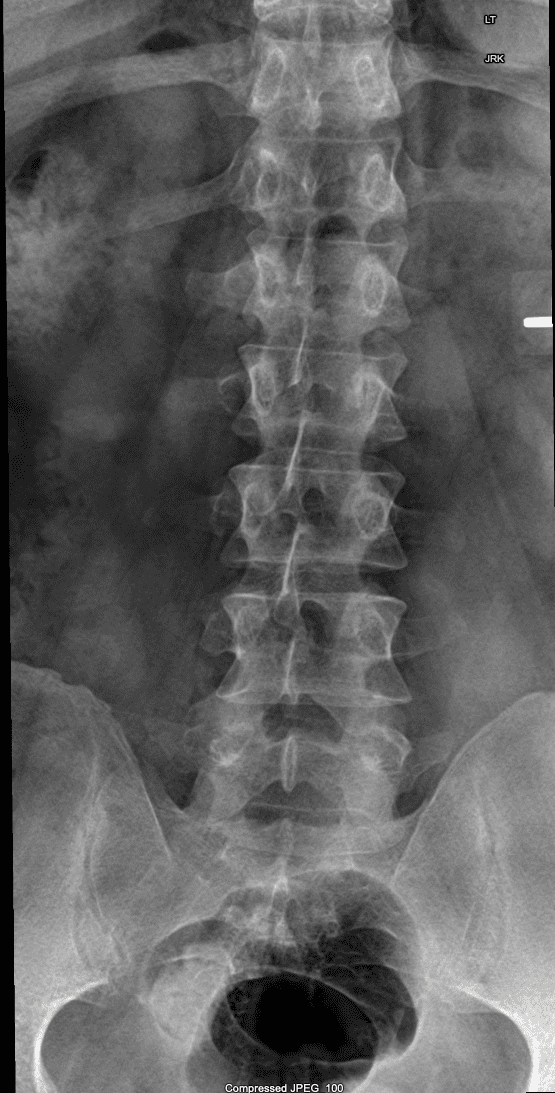
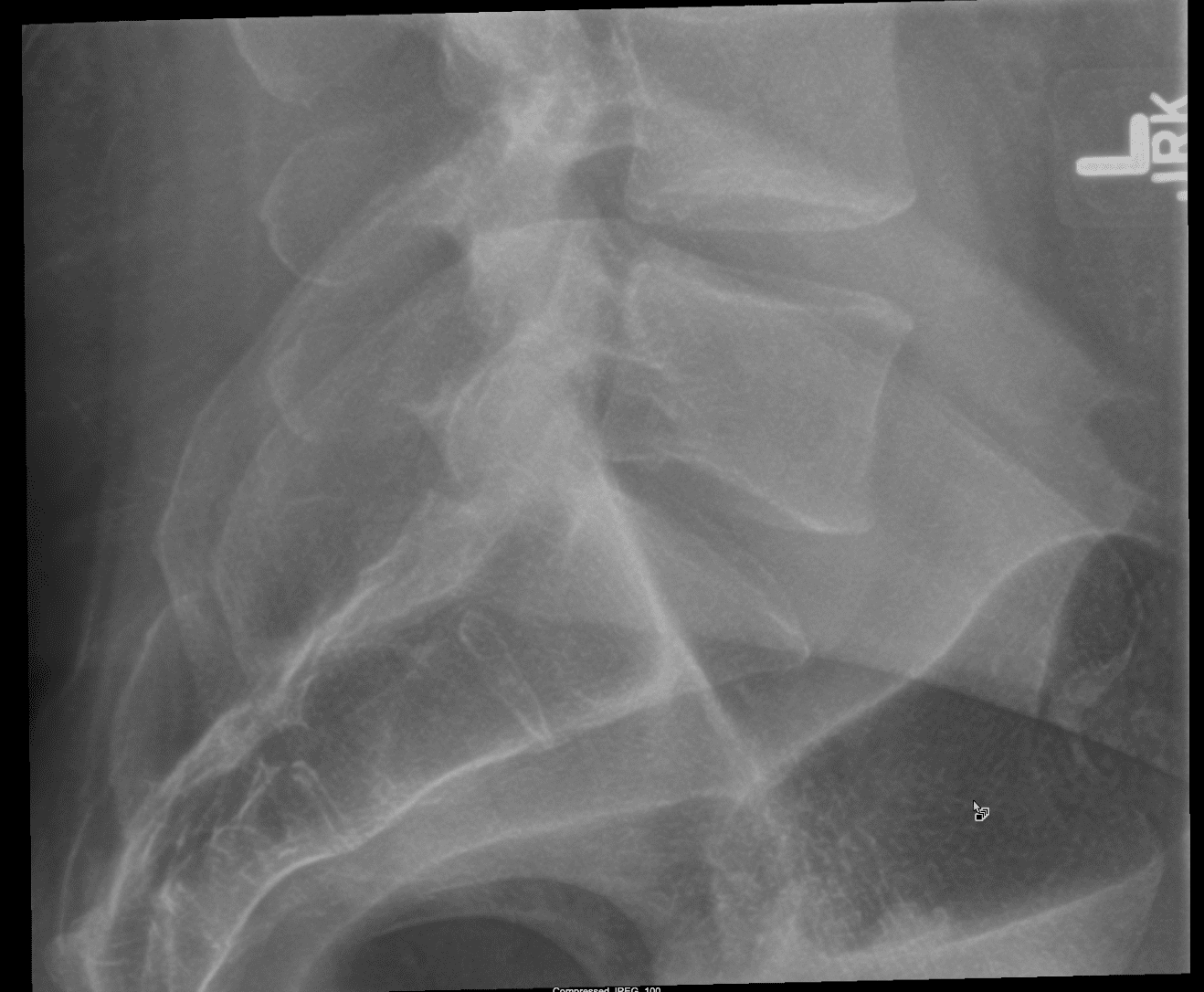
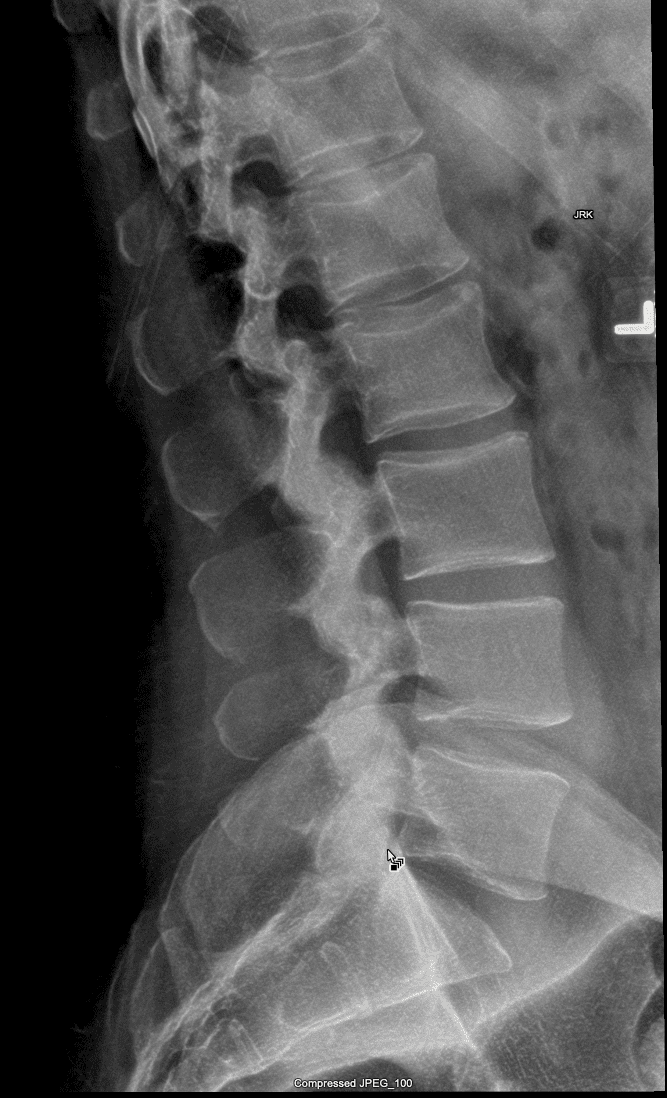
Spinal Tumor Treatments
If any tumor is located in the spine and if there’s no other known cancer, a healthcare professional may perform a comprehensive evaluation of all common organs in which cancer can develop. A comprehensive evaluation may include:
- Complete medical history
- Complete physical evaluation
- Complete neurological evaluation
- Radiographic study of the spine, chest, and GI tract
- MRI and CAT scan to evaluate the spine
Vertebral Column Tumor Treatment
Because many vertebral column tumors originate from cancer in another organ, the goal of spinal tumor treatment is to:
- Regulate severe painful symptoms which occur with these spinal tumors by removing pressure on the nerve roots
- Maintain neurological structure and function by removing pressure on the spinal cord
- Correct structural and functional instability in the spine by correcting the unstable spine with a spinal fusion
Intradural-Extramedullary and Intramedullary Tumor Treatment
These type of spinal tumors are generally surgically removed. The goal of spinal tumor treatment is to:
- Completely remove the spinal tumor
- Preserve neurological structure and function
The spinal cord and nerves are extremely sensitive and preventing damage to their structure and function is an essential portion of surgical intervention. Monitoring methods and techniques can be utilized throughout the surgery to make sure the structure and function of the spinal cord are preserved since the spinal tumors are ultimately being removed.
If the spinal tumor cannot be fully removed, by way of instance, if it adheres to many nerve roots, post-surgical radiation treatment can help improve outcome. If the spinal tumor is metastatic, chemotherapy may also be helpful. After the surgery, it could take some time for the nerves to fully recover. Rehabilitation can help enhance a patient’s neurological performance.
Differential Diagnosis of Hip Pain and Discomfort
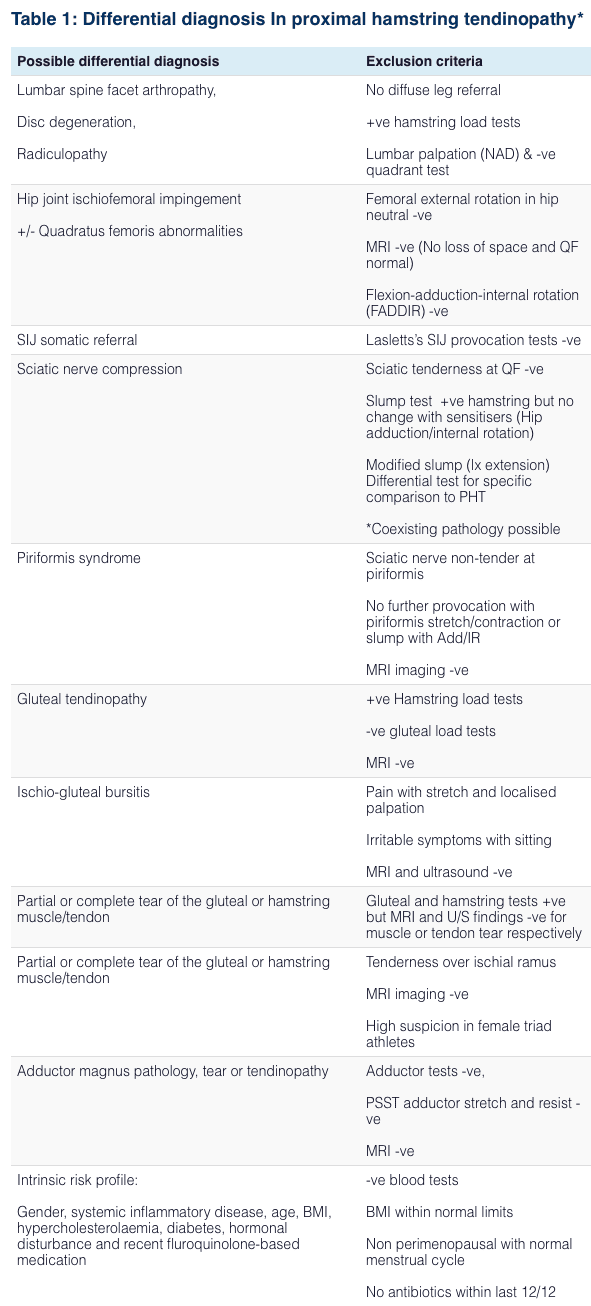

Spinal tumors can cause back pain and sciatica. Although most cases of back pain and sciatic nerve pain are not caused by a spinal tumor, it’s essential to receive an accurate diagnosis to determine the source of the painful symptoms. As mentioned above, common symptoms of spinal tumors include pain and discomfort as well as numbness. Spinal tumors are health issues which should be evaluated immediately by a healthcare professional to follow-up with proper treatment. – Dr. Alex Jimenez D.C., C.C.S.T. Insight
Fibromyalgia Magazine
The purpose of the article was to discuss spinal tumors and sciatica. Spinal tumors may often present symptoms of sciatica. Accurate diagnosis and proper treatment are important for this health issue. The scope of our information is limited to chiropractic, musculoskeletal and nervous health issues as well as functional medicine articles, topics, and discussions. To further discuss the subject matter above, please feel free to ask Dr. Alex Jimenez or contact us at 915-850-0900 .
Curated by Dr. Alex Jimenez
Additional Topic Discussion: Severe Sciatica
Back pain is one of the most prevalent causes of disability and missed days at work worldwide. Back pain attributes to the second most common reason for doctor office visits, outnumbered only by upper-respiratory infections. Approximately 80 percent of the population will experience back pain at least once throughout their life. Your spine is a complex structure made up of bones, joints, ligaments, and muscles, among other soft tissues. Injuries and/or aggravated conditions, such as herniated discs, can eventually lead to symptoms of sciatica, or sciatic nerve pain. Sports injuries or automobile accident injuries are often the most frequent cause of painful symptoms, however, sometimes the simplest of movements can have these results. Fortunately, alternative treatment options, such as chiropractic care, can help ease sciatic nerve pain, or sciatica, through the utilization of spinal adjustments and manual manipulations, ultimately improving pain relief.
Formulas for Methylation Support
XYMOGEN’s Exclusive Professional Formulas are available through select licensed health care professionals. The internet sale and discounting of XYMOGEN formulas are strictly prohibited.
Proudly, Dr. Alexander Jimenez makes XYMOGEN formulas available only to patients under our care.
Please call our office in order for us to assign a doctor consultation for immediate access.
If you are a patient of Injury Medical & Chiropractic Clinic, you may inquire about XYMOGEN by calling 915-850-0900.
For your convenience and review of the XYMOGEN products please review the following link.*XYMOGEN-Catalog-Download
* All of the above XYMOGEN policies remain strictly in force.
Post Disclaimer
Professional Scope of Practice *
The information on this blog site is not intended to replace a one-on-one relationship with a qualified healthcare professional or licensed physician and is not medical advice. We encourage you to make healthcare decisions based on your research and partnership with a qualified healthcare professional.
Blog Information & Scope Discussions
Welcome to El Paso's Premier Wellness and Injury Care Clinic & Wellness Blog, where Dr. Alex Jimenez, DC, FNP-C, a board-certified Family Practice Nurse Practitioner (FNP-BC) and Chiropractor (DC), presents insights on how our team is dedicated to holistic healing and personalized care. Our practice aligns with evidence-based treatment protocols inspired by integrative medicine principles, similar to those found on this site and our family practice-based chiromed.com site, focusing on restoring health naturally for patients of all ages.
Our areas of chiropractic practice include Wellness & Nutrition, Chronic Pain, Personal Injury, Auto Accident Care, Work Injuries, Back Injury, Low Back Pain, Neck Pain, Migraine Headaches, Sports Injuries, Severe Sciatica, Scoliosis, Complex Herniated Discs, Fibromyalgia, Chronic Pain, Complex Injuries, Stress Management, Functional Medicine Treatments, and in-scope care protocols.
Our information scope is limited to chiropractic, musculoskeletal, physical medicine, wellness, contributing etiological viscerosomatic disturbances within clinical presentations, associated somato-visceral reflex clinical dynamics, subluxation complexes, sensitive health issues, and functional medicine articles, topics, and discussions.
We provide and present clinical collaboration with specialists from various disciplines. Each specialist is governed by their professional scope of practice and their jurisdiction of licensure. We use functional health & wellness protocols to treat and support care for the injuries or disorders of the musculoskeletal system.
Our videos, posts, topics, subjects, and insights cover clinical matters and issues that relate to and directly or indirectly support our clinical scope of practice.*
Our office has made a reasonable effort to provide supportive citations and has identified relevant research studies that support our posts. We provide copies of supporting research studies available to regulatory boards and the public upon request.
We understand that we cover matters that require an additional explanation of how they may assist in a particular care plan or treatment protocol; therefore, to discuss the subject matter above further, please feel free to ask Dr. Alex Jimenez, DC, APRN, FNP-BC, or contact us at 915-850-0900.
We are here to help you and your family.
Blessings
Dr. Alex Jimenez DC, MSACP, APRN, FNP-BC*, CCST, IFMCP, CFMP, ATN
email: [email protected]
Licensed as a Doctor of Chiropractic (DC) in Texas & New Mexico*
Texas DC License # TX5807
New Mexico DC License # NM-DC2182
Licensed as a Registered Nurse (RN*) in Texas & Multistate
Texas RN License # 1191402
ANCC FNP-BC: Board Certified Nurse Practitioner*
Compact Status: Multi-State License: Authorized to Practice in 40 States*
Graduate with Honors: ICHS: MSN-FNP (Family Nurse Practitioner Program)
Degree Granted. Master's in Family Practice MSN Diploma (Cum Laude)
Dr. Alex Jimenez, DC, APRN, FNP-BC*, CFMP, IFMCP, ATN, CCST
My Digital Business Card




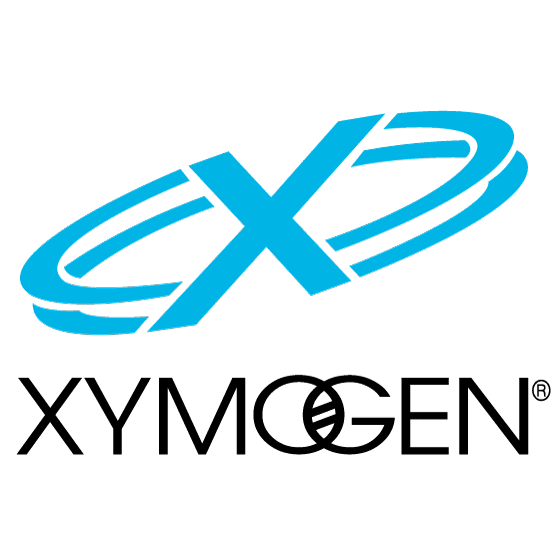
Comments are closed.